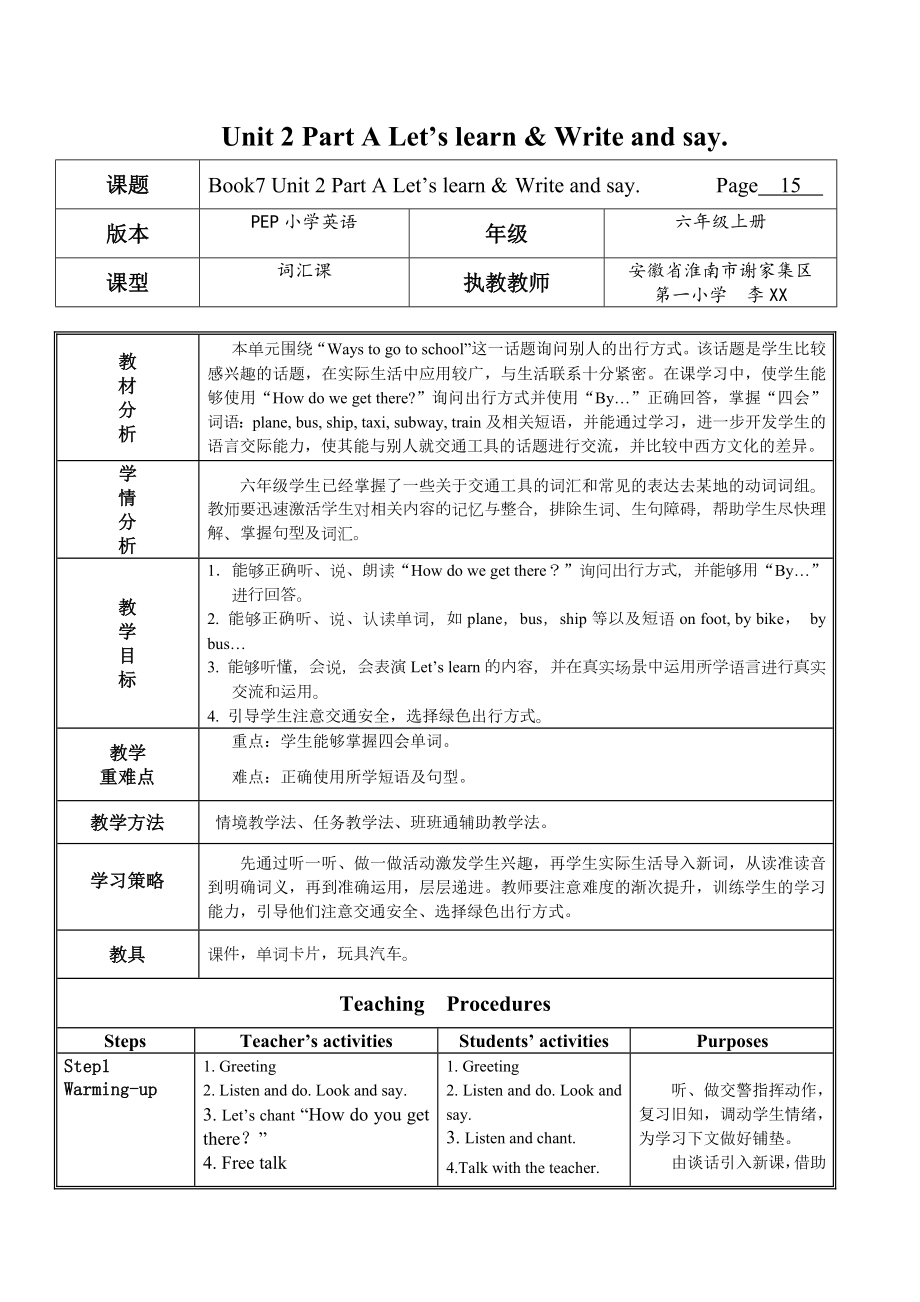《六年級上冊英語教案-Unit 2 Ways to go to school ! PartA let’s learn-人教(PEP)(2014秋) (1)》由會員分享�,可在線閱讀,更多相關(guān)《六年級上冊英語教案-Unit 2 Ways to go to school ! PartA let’s learn-人教(PEP)(2014秋) (1)(3頁珍藏版)》請在裝配圖網(wǎng)上搜索�。
1、Unit 2 Part A Let’s learn & Write and say.
課題
Book7 Unit 2 Part A Let’s learn & Write and say. Page 15
版本
PEP小學(xué)英語
年級
六年級上冊
課型
詞匯課
執(zhí)教教師
安徽省淮南市謝家集區(qū)
第一小學(xué) 李XX
教
材
分
析
本單元圍繞“Ways to go to school”這一話題詢問別人的出行方式���。該話題是學(xué)生比較感興趣的話題�����,在實際生活中應(yīng)用較廣�,與生活聯(lián)系十分緊密�。在課學(xué)習(xí)中�����,使學(xué)生能夠使用“How do we get ther
2���、e?”詢問出行方式并使用“By…”正確回答��,掌握“四會”詞語:plane, bus, ship, taxi, subway, train及相關(guān)短語���,并能通過學(xué)習(xí)���,進一步開發(fā)學(xué)生的語言交際能力,使其能與別人就交通工具的話題進行交流�,并比較中西方文化的差異�����。
學(xué)
情
分
析
六年級學(xué)生已經(jīng)掌握了一些關(guān)于交通工具的詞匯和常見的表達去某地的動詞詞組��。教師要迅速激活學(xué)生對相關(guān)內(nèi)容的記憶與整合��,排除生詞�、生句障礙�,幫助學(xué)生盡快理解、掌握句型及詞匯�。
教
學(xué)
目
標(biāo)
1.能夠正確聽、說�、朗讀“How do we get there?”詢問出行方式��,并能夠用“By…” 進行回答�。
2.
3��、能夠正確聽���、說、認讀單詞�����,如plane����,bus,ship等以及短語on foot, by bike���, by bus…
3. 能夠聽懂����,會說�,會表演Let’s learn的內(nèi)容����,并在真實場景中運用所學(xué)語言進行真實交流和運用。
4. 引導(dǎo)學(xué)生注意交通安全��,選擇綠色出行方式。
教學(xué)
重難點
重點:學(xué)生能夠掌握四會單詞��。
難點:正確使用所學(xué)短語及句型�。
教學(xué)方法
情境教學(xué)法、任務(wù)教學(xué)法��、班班通輔助教學(xué)法�。
學(xué)習(xí)策略
先通過聽一聽、做一做活動激發(fā)學(xué)生興趣��,再學(xué)生實際生活導(dǎo)入新詞����,從讀準(zhǔn)讀音到明確詞義,再到準(zhǔn)確運用�����,層層遞進�。教師要注意難度的漸次提升,訓(xùn)練學(xué)生的學(xué)習(xí)能力���,引導(dǎo)他們注
4�����、意交通安全����、選擇綠色出行方式。
教具
課件�,單詞卡片,玩具汽車��。
Teaching Procedures
Steps
Teacher’s activities
Students’ activities
Purposes
Step1 Warming-up
1. Greeting
2. Listen and do. Look and say.
3. Let’s chant “How do you get there���?”
4. Free talk
T:Guess�����!How do I come to school? This is my home. And thi
5��、s is our school.
Ss: By…
T: What about you?
1. Greeting
2. Listen and do. Look and say.
3. Listen and chant.
4.Talk with the teacher.
聽�����、做交警指揮動作����,復(fù)習(xí)舊知����,調(diào)動學(xué)生情緒,為學(xué)習(xí)下文做好鋪墊���。
由談話引入新課��,借助簡筆畫點明主題�。
Step2 Presentation
1. Let’s learn
a. Show a car and say: I come to school by car.
b. Draw and t
6�����、each the new phrases by the cards:
by plane/by taxi/by ship…
c. Listen and imitate.
d. Look and read.
e. Read the dialog.
f. Pair Work: The National Day is coming soon. Where do you want to go?
2. Write and say
a. Which way do you like?
b. Help Ss understand “get” and “f
7�����、rom”.
c. Ask and answer.
d. Write the places.
e. Group Work: Ask and answer.
f. Fill in the blanks.
1. Let’s learn
a. Listen and repeat.
b. Learn the new words by the cards and the picture on the board: by plane/by taxi/by ship
c. Listen and imitate.
d. Look and read.
e. Read the di
8���、alog.
f. Make a dialog.
2. Write and say
a. Which way do you like?
b. Help Ss understand “get” and “from”.
c. Ask and answer.
d. Write the places.
e. Group Work: Ask and answer.
f. Fill in the blanks.
拿出玩具小汽車演示���,幫助學(xué)生理解句子和短語。
以上班上學(xué)路及旅游線路為線索引出每個生詞�,
運用簡筆畫、單詞卡片幫助學(xué)生學(xué)習(xí)新詞�、理
9�、解詞義����。
聽文本錄音,輸入純正語音�����;朗讀文本���,模仿語調(diào)培養(yǎng)語感��。
分角色朗讀��,激發(fā)學(xué)生模仿���、運用語言的興趣。
讓學(xué)生說說國慶節(jié)的出游打算����,鞏固、運用所學(xué)知識�,輸出語言。
在以圍繞國慶出游的話題結(jié)束后,學(xué)生再做這個練習(xí)就容易多了�����。
通過肢體動作及簡筆畫幫助學(xué)生理解“get to” “from”����。
個人自主完成任務(wù)與同伴合作交流相結(jié)合�,操練、運用所學(xué)語言�。
以填寫表格的形式反饋。
Step 3. Consolidation
1. Play games.
2. Extract cards and make sentences.
1. Play ga
10���、mes.
2. Extract cards and make sentences.
通過游戲��、連詞成句的方式鞏固�����、運用所學(xué)內(nèi)容����。
Step 4.
Extension
1. Let’s chant.
2. Pay attention to the traffic lights, let students choose green travel way and obey the traffic rules.
3.Let’s sing.
1. Let’s chant.
2. Pay attention to the traffic lights.
了解交
11�、通安全知識,選擇綠色出行方式。
通過說唱�、歌曲總結(jié)所學(xué)知識,加深印象���。
Step 5.
Homework
1.Listen and recite the dialogue.
2.Write the phrases.
3.Make a new dialogue according to this lesson and act it out.結(jié)合本課學(xué)習(xí)內(nèi)容創(chuàng)建一個新對話并將其表演出來���。
Do homework..
在課后加強口語及寫作訓(xùn)練,培養(yǎng)學(xué)生綜合語言能力�。
板
書
設(shè)
計
教
學(xué)
反
思
“Interest”
12、 is the best teacher for students to learn English. In this lesson, I tried my best to develop the students’ interest in English by the means of CAI, the pictures on the board, and the games and tasks I designed. The students was happy in this class. Through learning this lesson, most of students can understand, read, say, write the words and them well in real situations. That’s so good.
 六年級上冊英語教案-Unit 2 Ways to go to school ! PartA let’s learn-人教(PEP)(2014秋) (1)
六年級上冊英語教案-Unit 2 Ways to go to school ! PartA let’s learn-人教(PEP)(2014秋) (1)

